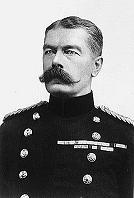Sudanese honour warriors who fell fighting British
By Amil Khan.
Sept 2, 2005 (Omdurman) — Brandishing spears and flags, around 1,500 Sudanese gathered at the site of the historic Battle of Omdurman on Friday to commemorate warriors who died trying to fend off British domination of their country.

“Everyone in Sudan remembers this battle. Everyone has a relative who died here,” said Mohammed Ali Abdul Majeed, who had come to visit the graves scattered around the site.
After Friday Muslim prayers, men, women and children travelled in a procession of cars, minibuses and pickup trucks to the former battlefield 11 km (7 miles) outside the town of Omdurman, now a suburb of Khartoum.
 Men wearing white robes and turbans waved fists in the air and shouted “Long live the memory of Karari!” as they drove along the sandy roads.
Men wearing white robes and turbans waved fists in the air and shouted “Long live the memory of Karari!” as they drove along the sandy roads.
The Sudanese name the battle after the Karari plain, where 50,000 Sudanese fighters armed with spears and rifles faced 8,000 British-led troops backed by artillery and newly-invented machineguns.
“It was a great slaughter,” added Abdul Majeed, who said his great-grandfather had been a commander of one of the Sudanese battalions.
The Sudanese forces were mown down by British artillery and Maxim guns, capable of firing 500 rounds per minute. Around 12,000 Sudanese fighters died, compared with around 50 in the British-led ranks.
“They (the Sudanese fighters) didn’t run, they didn’t get scared. They died in waves trying to reach the British lines through the bullets of the Maxim guns,” Abdul Majeed said.
SPEAR AND CRESCENT
The Sudanese forces were drawn from members of the Ansar (Supporters), a religious movement founded by Mohammed Ahmed, who took the title of al-Mahdi (The Chosen One).
Ahmed had previously fought and defeated the British in Sudan. His forces took Khartoum from British General Charles George Gordon, who died in 1885 trying to hold on to the Sudanese capital.
The fighters at Karari were led by Ahmed’s successor, Abdullah al-Taashi.
The Ansar, still a force in Sudanese politics under the leadership of Ahmed’s great-grandson, Sadiq al-Mahdi, organised Friday’s commemoration.
“We are here today, standing on ground where we killed and were killed,” Mahdi told the crowd, which included horsemen wearing turbans and carrying the movement’s spear and crescent flag.
Mahdi’s Umma (Nation) Party has allied with other Sudanese political forces to form an opposition bloc against a new government expected to be formed in the coming days as part of a peace deal to end a 21-year north-south civil war.
Ansar supporters make up the vast majority of the Umma Party’s membership. Many of those gathered at Karari said their families were originally from non-Arab parts of Sudan — including Darfur, now ravaged by conflict and a refugee crisis.
“Many of the commanders in the battle were from Darfur or the east of the country,” said one of the Ansar supporters, who came to the commemoration carrying jagged spears he said had been used against the British by his ancestors.
Sudanese Arabs make up the bulk of the country’s ruling elite and are concentrated in the north of the country, Africa’s largest by area.
Tens of thousands of people have been killed in recent violence in Darfur and around 2 million refugees remain in camps, dependent upon aid for survival.
Rebels in the east have also been fighting government troops. Darfur was the last part of Sudan to succumb to British rule in 1916.
Reuters News.
